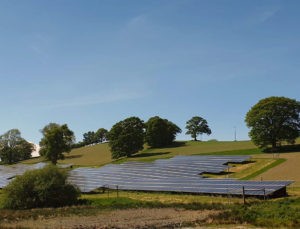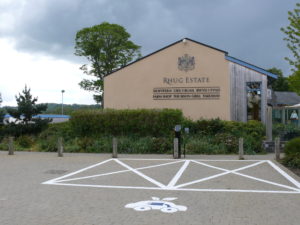With energy prices soaring in the UK at the moment, Rhug Estate is proud to be celebrating 10 years of producing renewable energy. What started with one solar panel scheme on the roof of the farm shop in 2012 has developed over the years to now incorporate 11 solar schemes, two wind turbines, a variety of hydro schemes, heat pumps in properties, a biomass boiler and two electric vehicle chargers.
Rhug Estate covers 12,500 acres in Denbighshire and 2,500 acres in Gwynedd, north Wales and sustainability has always been firmly at the heart of the business since Lord Newborough took over in 1998. Farmland, forestry, moorland, coastal areas, built property, and diversifications such as a farm shop, an organic meat business and a renewable energy company make up the estate. The capacity of the renewable energy schemes on the estate range from 4KW to 1.2MW and generated electricity is either used on site or exported to the grid.
Lord Newborough, owner of Rhug Estate, said, “The sustainable use of assets and natural resources has always been at the heart of everything we do at Rhug Estate. I have championed the highest standards of organic and sustainable farming for many years, protecting and enhancing the environment for future generations. We currently generate about 3,000MW of electricity per year. We also generate about 500MW per year of heat. This is enough to supply approximately 875 homes for the year. While we continually develop the company, we are being plagued by the lack of grid capacity. Something we are trying to bring to the attention of the Welsh Government.”

Rhug’s largest solar panel scheme
Rhug Energy Ltd is not stopping now however, it has plans for installing air-source heat-pumps in another three properties on the Estate and the team are in the final stages of enabling another hydro scheme. Rhug’s electric vehicle chargers are to be developed too, moving to rapid chargers.
Estate Manager for Rhug, Emma Story, said, “Without Lord Newborough’s vision and drive none of Rhug’s renewable energy schemes would have happened. It’s great that we are already at a significant milestone with plenty of ideas for growth. Philip Hughes looks at the feasibility of new technologies as they emerge, and I’ve been focused on getting more out of what we already have. The main game-changer has been using a DIY tendering platform for selling our electricity. This has allowed us to track the energy market and put sites out to tender when we think we might gain the highest rates.”
Ninety-seven per cent of the electric produced on Rhug’s estate is sold to energy companies via the grid through power purchase agreements or the Government’s guaranteed export payments. The remaining 3% is used on site. The farm shop buys 30% of its electric from Rhug Energy Ltd and the estate office gets half of its power from photovoltaics. The price is set at the half-way point between what we would get from a power purchaser and what would be paid to a grid supplier. Both companies benefit as well as the environment. The team are currently investigating the prospect of selling electricity to the estate’s tenants and the local area. The ‘hows’ are currently being explored.

Rhug’s Electric Car Charging spaces
Lord Newborough is already planning for the next 10 years and said, “We want to continue to be at the cutting edge of renewable energy production. We’d like to incorporate new technologies as they emerge in everything we do at Rhug. We think it’s also important to develop our understanding of the environmental footprint our supply chains leave and take responsibility for improving the impact of the whole chain by making well-informed decisions.”






 Organic Beef
Organic Beef